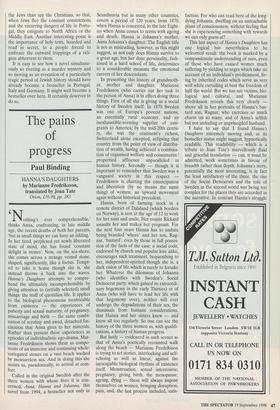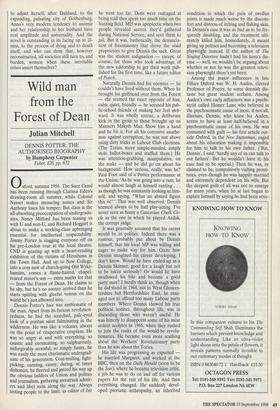The pains of progress
Paul Binding
HANNA'S DAUGHTERS by Marianne Fredriksson, translated by Joan Tate Orion, £16.92, pp. 283
Nothing's ever comprehensible,' thinks Anna, confronting, in late middle age, the recent deaths of both her parents, `but in small things we can have an inkling.' In her tired, perplexed yet newly liberated state of mind, she has found 'constant delight in stones'. Now, on the sea-shore, she comes across a strange veined stone, shaped, significantly, like a foetus. Tempt- ed to take it home though she is, she instead throws it back into the waves. Hanna's Daughters attempts to compre- hend the ultimately incomprehensible by giving attention to (artfully selected) small things: the stuff of quotidian life. It applies to the biological phenomena inextricable from existence — the experiences of puberty and sexual maturity, of pregnancy, miscarriage and birth — the same combi- nation of scrutiny and awed, detached fas- cination that Anna gives to her minerals. Rather than present these experiences as episodes of individualistic ego-drama, Mar- ianne Fredriksson shows them as compo- nents of an immense and continuing whole: variegated stones on a vast beach washed by measureless sea. And in doing this she assists us, paradoxically, to arrival at com- fort.
Called in the original Swedish after the three women with whose lives it is con- cerned, Anna, Hanna and Johanna, this novel from 1994, a bestseller not only in Scandinavia but in many other countries, covers a period of 120 years, from 1870, when Hanna is conceived, to the late Eight- ies when Anna comes to terms with ageing and death. Hanna is Johanna's mother, Anna Johanna's daughter. The English title is not as misleading, however, as this might suggest, as not only does Hanna survive to a great age, but her dour personality, fash- ioned in a hard school of life, determines to a considerable measure the emotional careers of her descendants.
In presenting this history of grandmoth- er, mother and daughter, Marianne Fredriksson (who carries out her task in the person of Anna) is in effect doing three things. First of all she is giving us a social history of Sweden itself. In 1870 Sweden was one of Europe's poorest nations, an essentially rural economy, and an inexhaustible-seeming supplier of emi- grants to America; by the mid-20th centu- ry, she was the continent's richest, Switzerland alone excepted, eclipsing that country from the point of view of distribu- tion of wealth, having achieved a combina- tion of organised welfare and consumerist / propertied affluence unparalleled in human history. Secondly — though it is important to remember that Sweden was a vanguard society in this respect Fredriksson is charting the emancipation and liberation (by no means the same thing) of women, an upward movement again without historical precedent.
Hanna, born of farming stock in a remote district of Dalsland (which borders on Norway), is sent at the age of 12 to work for her aunt and uncle. Her cousin Rickard assaults her and makes her pregnant. For the next four years Hanna has to endure being branded 'whore' and her son, Rag- nar, 'bastard', even by those in full posses- sion of the facts of the case: a social code, endorsed by church and popular lore alike, encourages such treatment, bequeathing to her, independent-spirited though she is, a dark vision of life which is rarely to forsake her. Whatever the dilemmas of Johanna (who identifies with Sweden's Social Democrat party, which gained its extraordi- nary hegemony in the early Thirties) or of Anna (who will have to lead her life with that hegemony over), neither will ever undergo the degradations of their sex, the dismissals from humane considerations, that Hanna and her sisters knew — and knew all too regularly. So one can see the history of the three women as, with qualifi- cations, a history of human progress.
But lastly — evidenced in such scenes as that of Anna's poetically recounted walk along the beach — Marianne Fredriksson is trying to set stories, interlocking and self- echoing as well as linear, against the inescapable biological rhythms of existence itself. Menstruation, sexual intercourse, pregnancy, giving birth, the menopause, ageing, dying — these will always impose themselves on women, bringing disruption, pain, and, the last process included, satis- faction. For who can read here of the long- dying Johanna, dwelling on an unreachable plane of consciousness, without feeling that she is experiencing something with rewards we can only guess at?
This last aspect of Hanna's Daughters has one logical but nevertheless to be welcomed result: the book is marked by a compassionate understanding of men, even of those who have caused women much suffering by yielding to urges which take no account of an individual's predicament, liv- ing by inherited codes which serve us very well while curtailing at best the freedom of half the world. But we too are victims, bio- logical and cultural, and Marianne Fredriksson reveals this very clearly above all in her portraits of Hanna's bas- tard son, Ragnar, who exercises so much charm on so many, and of Anna's selfish but not unfeeling or unprincipled husband.
I have to say that I found Hanna's Daughters extremely moving and, as its bestseller status might suggest, hypnotically readable. This readability — which is a tribute to Joan Tate's marvellously fluid and graceful translation — can, it must be admitted, work sometimes in favour of breadth rather than depth. Johanna's story, potentially the most interesting, is in fact the least satisfactory of the three, the rise of the Social Democrats and the role of Sweden in the second world war being too complex for the places they are accorded in the narrative. In contrast Hanna's struggle to adjust herself, after DaIsland, to the expanding, pulsating city of Gothenburg, Anna's very modern tendency to anomie and her relationship to her husband have real amplitude and universality. And the novel is outstanding in its facing up to ill- ness, to the process of dying and to death itself, and who can deny that, however reconstructed, all societies still turn to, and burden, women when these inevitable crises assert themselves?











































































 Previous page
Previous page